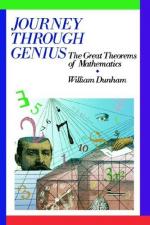
|
| Name: _________________________ | Period: ___________________ |
This test consists of 15 multiple choice questions and 5 short answer questions.
Multiple Choice Questions
1. What is a "depressed cubic"?
(a) A method to logically square all the factors in a cubic equation.
(b) A method to simpify the x squared value in a cubic equation.
(c) A method to solve equations with two variables.
(d) A method to simplify measuring complex geometric forms.
2. Dunham showed that Heron's proof could also be used as which of the following?
(a) A proof of Archimedes' number theory.
(b) A proof of Hippocrates' squared areas.
(c) A proof of Euclid's number theory
(d) A proof of the Pythagorean Theorem.
3. Which of the following best describes Archimedes as discussed by Dunham?
(a) Absent-minded genius.
(b) Creative but stubborn.
(c) Loud and arrogant.
(d) Mild-mannered researcher.
4. Which of Euclid's postulates troubled many of the following generations of mathematicians?
(a) Euclid's proof on right triangles.
(b) Euclid's postulate on creating an arc.
(c) Euclid's postulate on parallel lines.
(d) Euclid's postulate on right triangles.
5. Which words best describe how solid proofs were developed in Elements?
(a) Axiomatic framework.
(b) Simple arguments.
(c) Inverted scaffold.
(d) Programmed order.
6. What do we know in modern times about Heron?
(a) We know he lived in Rome.
(b) We know he was an influencial scholar, but we don't know who his students were.
(c) We know very little, but much of his work survives.
(d) We know he was a teacher and philosopher but much of his work has been lost.
7. What was Euclid's definition of a prime number?
(a) Numbers which do not, and can not, contain a perfect number.
(b) Numbers which can only be divided by themselves and 1.
(c) Numbers which are divisible by 2.
(d) Numbers which contain an infinite number of composite numbers.
8. What did Gauss set out to prove?
(a) That Euclid's postulate on straight lines was incorrect.
(b) That a right angle is always equal to 90 degrees.
(c) That the sum of the angles in a triangle is 180 degrees.
(d) That a circle can have less than 360 degrees.
9. What did Dunham claim about Archimedes's determination of a number value for pi?
(a) Archimedes's number could have been better if he had understood Euclid's work better,
(b) Archimedes's number was not very accurate, considering the technology of his time.
(c) Archimedes's number was perfectly correct.
(d) Archimedes's number was very good, considering he did not have a way to calculate square roots.
10. What is the name for determining the area of an enclosed space by constructing a square of equivalent area?
(a) Quadrature.
(b) Square root.
(c) Triangulation.
(d) Cubation.
11. Which of the following best describes Cardano's character?
(a) Eccentric.
(b) Flirtacious.
(c) Arrogant.
(d) Religious.
12. Which of the following was NOT one of the things Dunham claimed was ingenious about Euclid's proof of the Pythagorean theorem?
(a) Euclid used propositions about similar angles and parallel lines.
(b) Euclid stated that the diagonal hypotenuse of a right triangle is equal to the sums of the squares of the two legs.
(c) Euclid constructed squares on the sides of right triangles.
(d) Euclid used his own axioms and propositions to show relationships,
13. After Hippocrates, what shape did the Greeks attempt to square without success?
(a) Pentagon.
(b) Circle.
(c) Parallelogram.
(d) Hemisphere.
14. Which of the following can not be solved using algebra?
(a) Triangulation.
(b) Quintic equation.
(c) Quadratic equation.
(d) Geometric equation.
15. What was the bases of Hippocrates's proof ?
(a) Properties of points and lines.
(b) Properties of squares and cubes.
(c) Properties of area to volume measurements.
(d) Properties of triangles and semicircles.
Short Answer Questions
1. Who was the author of the book Elements?
2. Which of the following was NOT one of the basic definitions in Elements?
3. Who asked Tartaglia for his solution to cubic equations?
4. In general, what did Euclid's number theory describe?
5. What was Eratosthanes most famous for?
|
This section contains 649 words (approx. 3 pages at 300 words per page) |

|




